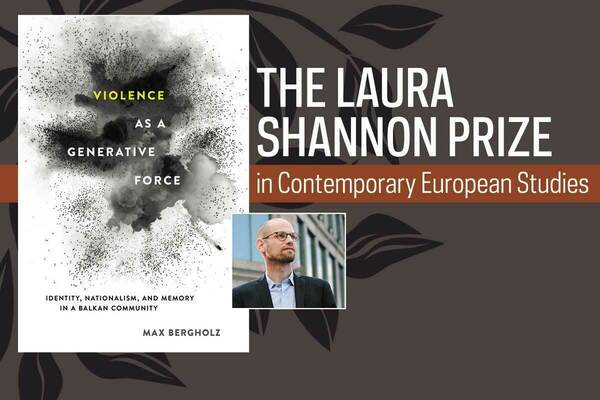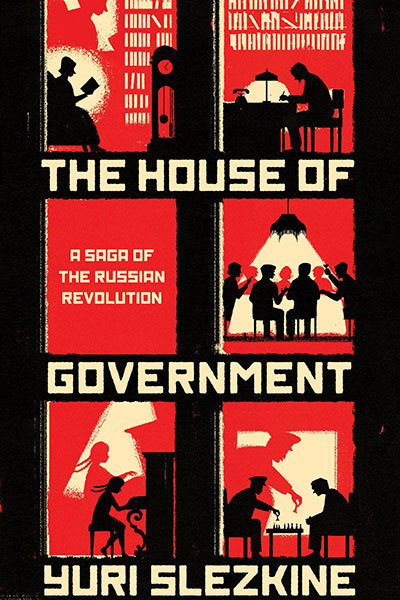
The Nanovic Institute for European Studies at the University of Notre Dame has awarded the 2019 Laura Shannon Prize in Contemporary European Studies to Max Bergholz for his book Violence as a Generative Force: Identity, Nationalism, and Memory in a Balkan Community, published by Cornell University Press.
The Laura Shannon Prize, one of the preeminent prizes for European studies, is awarded each year to the best book that transcends a focus on any one country, state, or people to stimulate new ways of thinking about contemporary Europe as a whole. This year’s cycle of the award considered books in history and social sciences published in 2016 or 2017.
Examining the intercommunal violence in a community on the border of Bosnia and Croatia, Violence as a Generative Force received high praise by the jury:
Restrained, humane, and beautifully written, and drawing intelligently on ethnography, psychology, and genocide studies, Violence as a Generative Force deserves to be read not only by Europeanists but by anyone seeking to understand the dynamics of mass violence. Max Bergholz shows violence was less a consequence of than a catalyst to ethnic identification and polarization. It was “generative” both in that it took on a dynamic of its own, and in that it could cement–and even fix in memory–ethnic identities that had been much more fluid and contingent. In this study, Bergholz asks us to think again about the sources, processes, and consequences of ethnic violence. When and why do neighbors turn on neighbors? From a careful reading of disparate and challenging sources, Bergholz reconstructs a shocking series of massacres and reprisals that took place in 1941 in the region of Kulen Vakuf in northwest Bosnia and that left many hundreds of men, women, and children dead. This was intimate violence: men shot, mutilated or cut the throats of people they often knew; they tossed their bodies into pits or rivers or burned them alive; they stole everything worth stealing and then razed houses and farms to the ground.

But at each stage of his often disturbing story, Bergholz shows how contingency, local relations, and even personal choice affected the course of events: we see how killings could begin when local hoodlums or opportunists were suddenly granted authority and guns; how opportunities for score-settling or looting led others to join in; how fears of reprisals or a desire for vengeance could escalate violence; how the presence or absence of a few particularly respected or determined individuals could tip the balance of who lived or died.
Max Bergholz is associate professor of history at Concordia University in Montreal, where he holds the James M. Stanford Professorship in Genocide and Human Rights Studies. His work focuses on microhistorical approaches to the history of modern Europe with an emphasis on the local dynamics of nationalism, intercommunal violence, and historical memory. He will visit Notre Dame during the fall semester of 2019 to accept the prize, deliver a public lecture, and meet with students and faculty.

The Shannon Prize jury also awarded honorable mention to both John R. Bowen, Dunbar-Van Cleve Professor in Arts & Sciences at Washington University in St. Louis, for his book On British Islam: Religion, Law, and Everyday Practice in Shariʿa Councils, and to Yuri Slezkine, Jane K. Sather Professor of History at the University of California, Berkeley, for his book The House of Government: A Saga of the Russian Revolution; both books are published by Princeton University Press.
The jury commended On British Islam, stating:
On British Islam is a meticulous and erudite analysis of British Islam and its institutional manifestations. Blending ethnography, political science, and history, Bowen demonstrates how place of origin and kin networks, location, sect, gender, generation, interpretive traditions, and a host of other factors can influence the way key issues like divorce are adjudicated by Shari'a councils. In so doing, he demonstrates conclusively that local Islamic institutions function not as foreign, corrosive bodies undermining Britishness, but as important sites for the nurturing and preservation of Islamic identity and tradition that at the same time foster dynamic convergence to British legal norms and principles. The research is impeccable, and the broader conclusions speak to contemporary questions of great import and consequence in Britain and elsewhere.
The jury’s final statement on Slezkine’s The House of Government was equally enthusiastic:

Yuri Slezkine's The House of Government is a monumental achievement, the result of phenomenal and invariably resourceful research. Like Tolstoy’s War and Peace or Solzhenitsyn’s The Gulag Archipelago, it weaves together the stories of individuals, the drama of history, and a deep meditation on the human condition. Slezkine's beautifully presented study grabs the reader, who will care about what happens to the many people whose lives--and deaths--he animates as the Russian Revolution and the Stalinist era unfold. Drawing on a broad history of religious millenarianism, Slezkine offers the intriguing and controversial thesis that the Bolsheviks were just such a movement. They, too, expected an imminent apocalyptic transformation of human existence itself. Such was their certainty that they saw little need to nurture Bolshevik commitment in their own children, and when the revolution failed to inaugurate the millennium, they turned on each other in frustration in the Stalinist Great Terror. The logic of millenarianism thus allows us, according to Slezkine, to understand both Bolshevism’s rise and its ultimate failure. The House of Government is a tour de force, and one that really matters.
The jury for this year’s prize consisted of a distinguished group of scholars:
Ruth Abbey
Professor of Political Science
University of Notre Dame
Jeffrey J. Anderson
Graf Goltz Professor and Director of the BMW Center for German and European Studies
Georgetown University
Alexander Martin
Professor of History
University of Notre Dame
John Merriman
Charles Seymour Professor of History
Yale University
Susan G. Pedersen
Gouverneur Morris Professor of History
Columbia University
Now in its tenth year, the Laura Shannon Prize is made possible through a generous endowment from Michael and Laura Shannon of Houston, Texas. Laura serves on the Nanovic Institute’s Advisory Board and Michael, class of 1958, serves on Notre Dame’s Graduate Studies and Research Advisory Council.
The Nanovic Institute for European Studies at the University of Notre Dame is committed to enriching the intellectual culture of Notre Dame by creating an integrated, interdisciplinary home for students and faculty to explore the evolving ideas, cultures, beliefs and institutions that shape Europe today. The Institute is an integral part of Notre Dame’s Keough School of Global Affairs. For additional information about the Nanovic Institute and the Laura Shannon Prize, visit nanovic.nd.edu/prize.